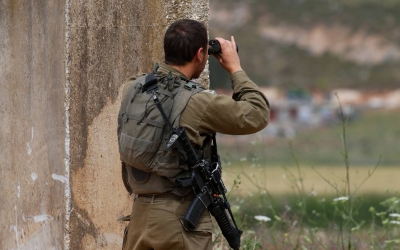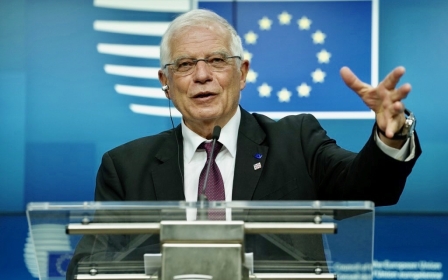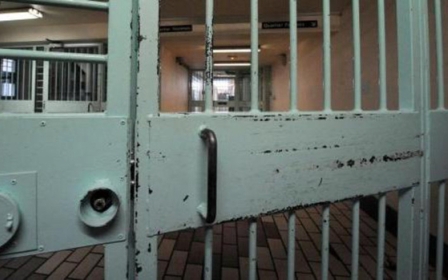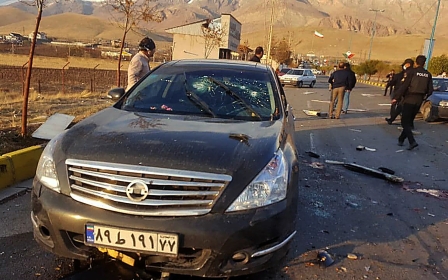Iran sees Israeli message on Syria and nuclear talks in assassination
At around 4pm on Sunday, Sayad Khodai, a colonel with Iran's Islamic Revolutionary Guard Corps (IRGC), was parking his car outside his home when two men on a motorcycle approached and opened fire, killing him.
The IRGC identified Khodai only as a "defender of the shrine" - attributed to those who went to Syria and fought Islamic State (IS) combatants who were threatening sacred Shia shrines.
Sabreen News, which is close to the IRGC, described Khodai as a member of the Guard's elite Quds force, the overseas arm of the IRGC.
A spokesperson for Iran’s armed forces, General Abolfazl Shekarchi, accused the US and Israel of being behind the assassination, calling them the “centre for planning and policy-making for terrorist acts in the world”.
Iranian President Ibrahim Raisi lamented the death of Khodai, blaming the "hands of global arrogance" for his killing and vowed revenge.
"I insist on the serious pursuit (of the killers) by security officials, and I have no doubt that the blood of this great martyr will be avenged," Raisi said.
Abdullah Ganji, the former chief editor of Javan, the IRGC newspaper, tweeted that “the kind of mission this martyr had in Syria points the finger of assassination at the Zionists”, perhaps alluding to reports that Khodai had had a major role in transferring Iranian weapons to Syria.
The Israeli air force has repeatedly attacked Iranian positions in Syria and convoys en route to Lebanon.
Meanwhile, some observers in Iran believe that this assassination was in response to the revival of the Joint Comprehensive Plan of Action (JCPOA), the 2015 deal that put limitations on Iran’s nuclear programme in return for sanctions relief. In 2018, then President Donald Trump unilaterally withdrew the US from the deal.
In the past year, Iran and the US have been engaged in indirect talks to revive the JCPOA. The deal is almost done but Tehran and Washington are deadlocked over the issue of the IRGC’s name being on the US Foreign Terrorist Organisations (FTO) list.
To break the impasse, the European Union suggested a “middle way”, whereby the IRGC would be taken off the list and its Quds force added instead.
In this vein, Enrique Mora, the EU's chief nuclear negotiator, travelled to Iran two weeks ago. The EU later described the talks with Iran as “positive enough” to reopen the stalled nuclear negotiations after two months of deadlock.
Israel against JCPOA revival
Several analysts in Iran believe that Israel assassinated the IRGC colonel to create a new obstacle against the revival of the JCPOA.
"The trip of Mr Mora and the Qatar emir to Tehran, as well as President Raisi's visit to Oman, indicates that there are moves in the direction of resolving the differences and bringing the US point of view closer to Iran," a former Iranian diplomat, speaking to Middle East Eye on condition of anonymity, said.
Raisi visited Oman on Monday and was received by Sultan Haitham bin Tarik for talks on economic cooperation. Qatar's Emir Tamim bin Hamad Al Thani visited Tehran earlier this month for talks with Raisi and the supreme leader on regional and bilateral issues.
"In the light of these moves, the chance of the JCPOA being revived will increase. That is why Israel is so unhappy.”
He added: “Iran’s main concern about the FTO list issue was that it would enable Israel and the US to resort to killing Iranian commanders easily. So the new EU proposal could have satisfied Iran.
'Israel … seeks to anger Iran and force it into a conflict while bringing the US and Nato behind it'
- Former Iranian diplomat
"But this new assassination might have been done to make Iran more inflexible as it sent the message that, with the Quds force added to the list, they would be killed too by both Americans and Israelis.
“Israel … seeks to anger Iran and force it into a conflict while bringing the US and Nato behind it. I think in the wake of such high tensions, the JCPOA will not be revived.
"Israel is more concerned that if this agreement is reached, its weight and status in the region will be seriously jeopardised."
Meanwhile, a reliable source told MEE that Israel had already had success in manipulating Iran’s politics by carrying out assassinations.
At least six Iranian scientists and academics have been killed or attacked since 2010, several of them by assailants riding motorcycles, in incidents believed to have targeted Iran’s nuclear programme.
The source said that in November 2020, Israel had two objectives in the assassination of Iran’s top nuclear scientist Mohsen Fakhrizadeh: firstly, to get rid of a powerful driving force behind Iran’s nuclear programme; secondly, and more importantly, disruption of the JCPOA revival.
The source said: “At the time, the Joe Biden administration had reached a compromise with reformist-backed Hassan Rouhani's government for a quick return to the JCPOA. But the assassination angered hardliners and they put big obstacles in the way.”
'Clear message behind killing'
Regarding the importance of the IRGC’s name on the FTO list, a European diplomat, who previously served in Iran, told MEE: “If the IRGC remains listed - even if it is, as we know, rather symbolic as the IRGC is under other US sanctions - it would be very difficult to resist Israeli [and US] pressure to stop business with Iran. And I guess Iran knows that too.”
He also believes that the assassination killed two birds with one stone.
“There is also another clear message behind the killing," he said. "The assassination was not only aimed to disrupt the JCPOA talks but was also linked to the Syrian scenario.”
He continued: “At a time when Russia is giving more space [and military bases] to Tehran in Syria because of the Ukrainian war, ‘somebody’ is saying ‘don’t move further, we can come directly in your house to stop you’. It is not a coincidence that the IRGC colonel worked in Syria.
“Interestingly this time officers working in the nuclear programme were not hit. This seems to suggest that the attack had a broader meaning, and Syria, I believe, is the main issue here.”
Meanwhile, referring to Khodai's assassination, the conservative Mehr news agency argued that “in these days when there are rumours about the withdrawal of Russian troops from Syria, the Zionist regime is more afraid of a strengthened and expanded resistance in Syria.
"This can be considered as a factor in the increasing levels of their insane operations.”
Middle East Eye propose une couverture et une analyse indépendantes et incomparables du Moyen-Orient, de l’Afrique du Nord et d’autres régions du monde. Pour en savoir plus sur la reprise de ce contenu et les frais qui s’appliquent, veuillez remplir ce formulaire [en anglais]. Pour en savoir plus sur MEE, cliquez ici [en anglais].






